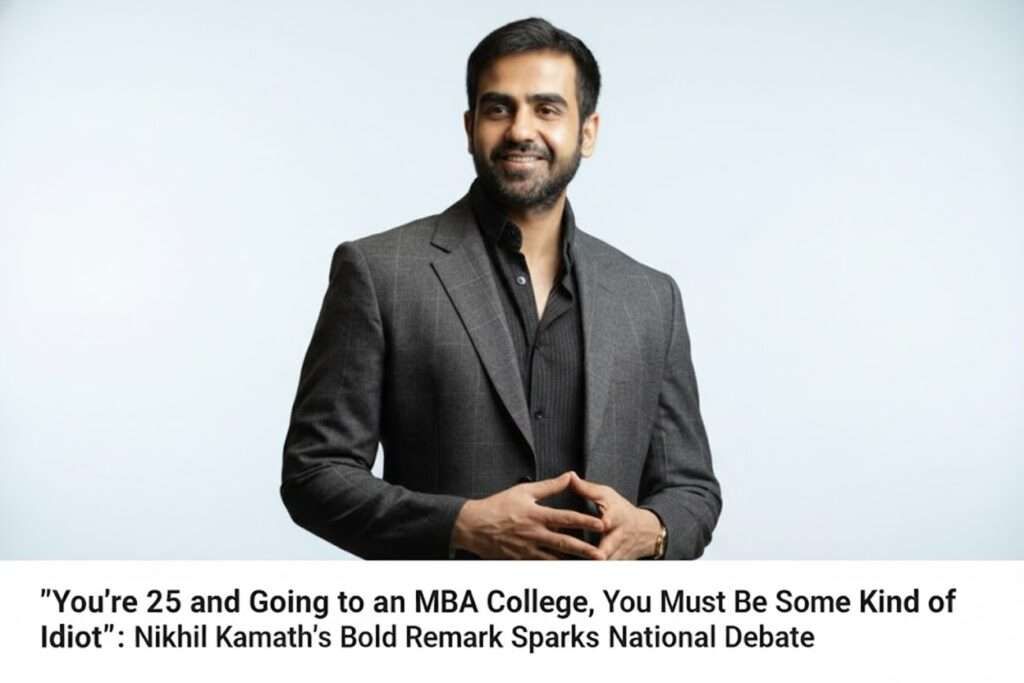News Desk – Zerodha co-founder Nikhil Kamath has once again ignited a debate across India with his now-viral remark: “If you’re 25 and going to an MBA college today, you must be some kind of idiot.”
Kamath, known for speaking his mind without filters, argued that colleges are dead in today’s world — a world where AI, online learning, and real-world experience can supposedly teach you faster and cheaper than any formal degree.
But does this idea hold true in a country like India, where structured education still remains one of the strongest ladders to financial and social growth? Let’s look at both sides — with data, not just opinions.
The Case for Formal Education: Still a Gateway, Not a Graveyard
Yes, Kamath’s view is bold, but numbers tell a slightly different story.
As per the Data of CMIE (Centre for Monitoring Indian Economy), the unemployment rate among Indian graduates is around 13.4%. But it also jumps to 21% for those without a college degree or formal graduation. Furthermore, the NASSCOM 2024 Employability Report found that MBA graduates from the top five most employable groups in India with nearly 63% landing jobs just after six months of finishing their degree or formal education.
| Education Level | Average Annual Income (₹) | Unemployment Rate |
|---|---|---|
| Postgraduate (MBA, M.Tech, etc.) | ₹10.2 lakh | 13.4% |
| Undergraduate (BBA, BCom, BA, etc.) | ₹6.1 lakh | 17.5% |
| No College Degree | ₹3.8 lakh | 21.2% |
At the top tier, the picture is even stronger. IIM Ahmedabad, ISB Hyderabad, and IIM Calcutta continue to show near-perfect placements, with average packages touching ₹38–40 lakh per year. Clearly, formal education isn’t dying — it’s still evolving.
| Business School | 2024 Avg. CTC | Placement Rate |
|---|---|---|
| IIM Ahmedabad | ₹40 lakh | 100% |
| ISB Hyderabad | ₹38 lakh | 100% |
| IIM Calcutta | ₹37 lakh | 99% |
The AI Irony: When Technology Both Destroys and Demands Learning
Kamath’s frustration, or what we call an idea, mainly comes from what’s happening around the world right now in 2025 or coming years – automation, AI, and massive workplace changes. Recently, Amazon announced it will cut around 14,000 managerial roles globally by 2025, replacing layers of middle management with AI systems.
That’s real. But here’s the irony: while AI may replace jobs, it’s also creating a huge demand for reskilling.
The World Economic Forum’s “Future of Jobs 2025” report says 44% of global workers will need retraining by 2030. So yes, the world is shifting fast — but it’s the kind of change that actually makes education more critical, not less.
Interestingly, the University Grants Commission (UGC) reports a 28% increase in online MBA enrolments in India since 2022. That’s not death — that’s transformation.
Beyond Degrees: The Real Meaning Behind Kamath’s Words
However, beneath his harsh tone, Kamath does raise valid questions. Are colleges still teaching what the world truly needs? Are we focusing on real problem-solving or just degrees and grades?
His real message, if you look closely, is not “don’t study,” but “don’t study blindly.” Education must evolve faster — less rote, more relevant.
India’s ₹10 lakh crore education industry has to understand that the future belongs to flexible learners — people who mix formal learning with self-learning, experience, and adaptability.
EaseMoney’s Point of View: Education + AI = Adaptability
At EaseMoney, we see both sides clearly.
Yes, Kamath is right that outdated education can’t survive this AI-driven world. But he’s wrong to dismiss college altogether. Formal education isn’t dead — it’s under massive renovation.
AI and technology should complement education, not compete with it. An MBA without real-world thinking is useless — but rejecting structured learning altogether is even more foolish.
In the end, the smartest learners won’t be the ones who skipped college — they’ll be the ones who made education smarter.
More News – Who is Dr Aniruddha Malpani? Mumbai Investor Behind the ‘Zerodha Scam’ Allegation

